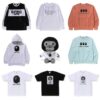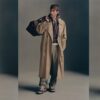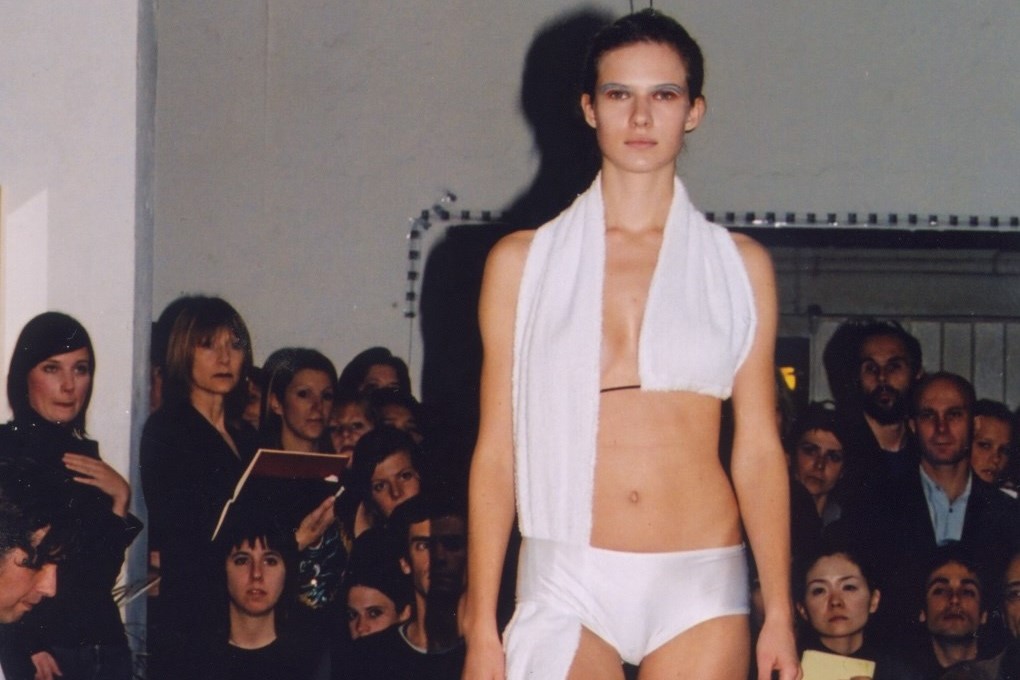
Rewrite
In the leadup to her career retrospective and book launch, the cult Swedish designer tells the story behind her hyper-femme label
Among the fashion cognoscenti, Ann-Sofie Back is something of an unsung hero. In fact, the late stylist Cathy Edwards once described her as the least appreciated designer – praise indeed. Fortunately, since hanging up her sartorial gloves in 2018, the Swedish designer, who built a cult of proto-coquettes, has been busy putting her 10,000-something garment archive to good use.
Airing this Autumn at the esteemed Stockholm gallery, Liljevalchs, Ann-Sofie’s exhibition, entitled Go As You Please, presents her work non-chronologically, crossing seasons and years. Co-curated with long-time colleague and stylist Nicole Walker, the show is accompanied by a book – published with Art & Theory – primed with new stories documenting archival designs. Behind the lens, one of Ann-Sofie’s earliest peers, Anders Edström.
Ann-Sofie first met Anders on a shoot in Brixton when they were paired together. Ann-Sofie was styling – another core part of her visual lexicon documented in Go As You Please – and Anders shooting. “It was super awkward,” she says, video-calling from her home. “But that’s something I share with him; I like being comfortable in being awkward. That’s my sort of safe spot.” Behind Ann-Sofie, a lampshade topped with a crimson polyester wig decorates the room. It’s a design from Gnilmyd Kcab, a homeware label she co-founded in 2022. “I’m doing that as well,” she explains.
Now 53, Ann-Sofie might not be churning out collections, but her task ahead is profound. For the past four years, she’s been collating her imagery and designs worthy of exhibition, getting the rights where necessary and, in essence, trying to make sense of her life’s career.
So, where to start? Ann-Sofie’s entrance into Planet Mode was less than smooth. Growing up in the sleepy Stockholm outskirts of Stenhamra, where nice cars took priority over books and aesthetic concerns, Ann-Sofie felt like an outsider. She recalls a sense of embarrassment that came when she recognised her parents had little to no interest in fashion. “Even if we drove through the city centre, I would duck in the car because I was so ashamed of being seen with my parents,” she says. “I was middle class. I didn’t have a hard upbringing or anything, but fashion wasn’t considered worthwhile.”
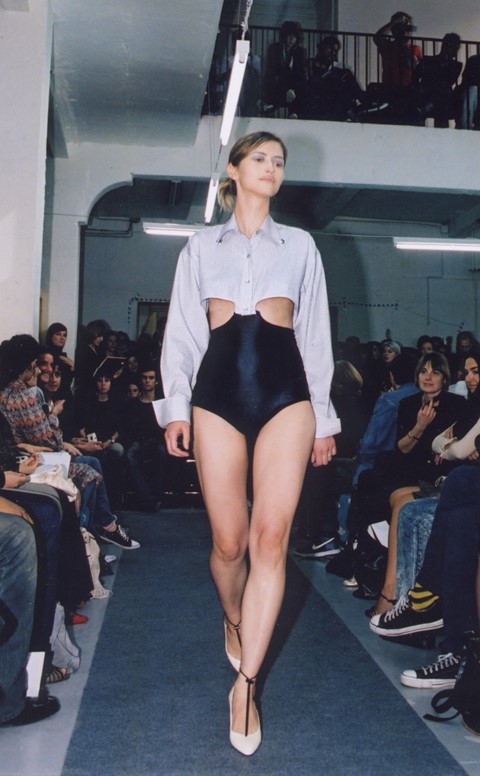
Still, this shame pushed Ann-Sofie into fashion. Eventually, she made her way to Beckmans College of Design in Stockholm to study fashion – “apart from a few, I didn’t feel the tutors had a burning interest in fashion,” she laments – before arriving at Central Saint Martins for her MA, graduating in 1998. Studying under the late, great and infamously fiery Louise Wilson, Ann-Sofie was blown away by Louise’s way of talking to students but impressed by her knowledge all the same.
Once she left art school, Ann-Sofie eventually set up her namesake label. Rather than suppressing her interest in feminine clichés, she put them front and centre in her designs. For her debut collection, Spring/Summer 2002, she sent models out in cool T-shirt dresses, primed with bra-cup frou or shadowed prints of a bra and panties – yonks before underwear as outerwear became a runway mainstay. The undies followed throughout her career, appearing in other seminal collections, such as A/W08, entitled Celebrity Obsession, an obtuse offering that morphed spaghetti straps into slip dresses, placing cut-outs along the lower back and even splitting the seam of a pencil skirt. This was her attempt to address the late 00s penchant among tabloid press to expose stars’ underwear – a conundrum she didn’t so much solve as she did diagnose it with piercing acuity.
Nonetheless, while such collections as Celebrity Obsession remain some of her most revered, Ann-Sofie has found herself pleasantly surprised by those she had once hated – one upshot of hindsight. Her A/W02 collection, made by reshashing materials from DIY textile catalogues (“where fashion goes to die”) is undoubtedly chic, if not a little severe. Here, garments deemed cheap or tasteless are spliced together in dishevelled low-cut dresses or clunky halter necks overlaid in transparent plastics. On the flipside, she’s also come to see the importance of her integrity. “The collections that were quite well received at the time have not aged as well,” affirms Ann-Sofie.
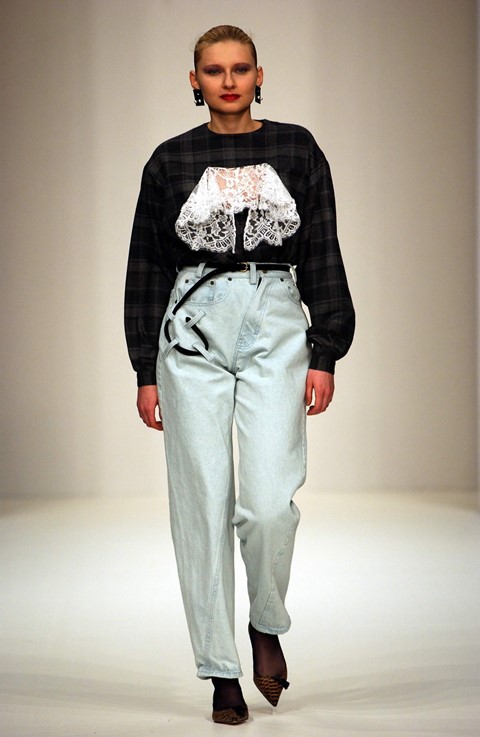
More broadly, Ann-Sofie’s reckoning with taste also made itself manifest in her shows’ soundtracks. In preparation for the upcoming exhibition, she’s been working through her back catalogue of intentionally campy song choices. “I was basically trying to make the audience cringe,” she concludes.
For the exhibition and book, Ann-Sofie incorporates oeuvres from her mainline brand, as well as the financially successful Back diffusion line and her foray into demi-couture, Ann-Sofie Back Atelje. Together, they build a picture of a designer who wanted to see real, messy and complex personalities in directional clothes. Alongside her early embrace of street casting and jarring approach to show choreography – sometimes starting with applause before the show had finished – the garments confirm that she is and remains the queen of awkward, offbeat glamour.
Go As You Please – Ann-Sofie Back 1998-2018 is on show at Liljevalchs in Stockholm from 8 November 2024 – 23 February 2025.
in HTML format, including tags, to make it appealing and easy to read for Japanese-speaking readers aged 20 to 40 interested in fashion. Organize the content with appropriate headings and subheadings (h1, h2, h3, h4, h5, h6), translating all text, including headings, into Japanese. Retain any existing
tags from
In the leadup to her career retrospective and book launch, the cult Swedish designer tells the story behind her hyper-femme label
Among the fashion cognoscenti, Ann-Sofie Back is something of an unsung hero. In fact, the late stylist Cathy Edwards once described her as the least appreciated designer – praise indeed. Fortunately, since hanging up her sartorial gloves in 2018, the Swedish designer, who built a cult of proto-coquettes, has been busy putting her 10,000-something garment archive to good use.
Airing this Autumn at the esteemed Stockholm gallery, Liljevalchs, Ann-Sofie’s exhibition, entitled Go As You Please, presents her work non-chronologically, crossing seasons and years. Co-curated with long-time colleague and stylist Nicole Walker, the show is accompanied by a book – published with Art & Theory – primed with new stories documenting archival designs. Behind the lens, one of Ann-Sofie’s earliest peers, Anders Edström.
Ann-Sofie first met Anders on a shoot in Brixton when they were paired together. Ann-Sofie was styling – another core part of her visual lexicon documented in Go As You Please – and Anders shooting. “It was super awkward,” she says, video-calling from her home. “But that’s something I share with him; I like being comfortable in being awkward. That’s my sort of safe spot.” Behind Ann-Sofie, a lampshade topped with a crimson polyester wig decorates the room. It’s a design from Gnilmyd Kcab, a homeware label she co-founded in 2022. “I’m doing that as well,” she explains.
Now 53, Ann-Sofie might not be churning out collections, but her task ahead is profound. For the past four years, she’s been collating her imagery and designs worthy of exhibition, getting the rights where necessary and, in essence, trying to make sense of her life’s career.
So, where to start? Ann-Sofie’s entrance into Planet Mode was less than smooth. Growing up in the sleepy Stockholm outskirts of Stenhamra, where nice cars took priority over books and aesthetic concerns, Ann-Sofie felt like an outsider. She recalls a sense of embarrassment that came when she recognised her parents had little to no interest in fashion. “Even if we drove through the city centre, I would duck in the car because I was so ashamed of being seen with my parents,” she says. “I was middle class. I didn’t have a hard upbringing or anything, but fashion wasn’t considered worthwhile.”

Still, this shame pushed Ann-Sofie into fashion. Eventually, she made her way to Beckmans College of Design in Stockholm to study fashion – “apart from a few, I didn’t feel the tutors had a burning interest in fashion,” she laments – before arriving at Central Saint Martins for her MA, graduating in 1998. Studying under the late, great and infamously fiery Louise Wilson, Ann-Sofie was blown away by Louise’s way of talking to students but impressed by her knowledge all the same.
Once she left art school, Ann-Sofie eventually set up her namesake label. Rather than suppressing her interest in feminine clichés, she put them front and centre in her designs. For her debut collection, Spring/Summer 2002, she sent models out in cool T-shirt dresses, primed with bra-cup frou or shadowed prints of a bra and panties – yonks before underwear as outerwear became a runway mainstay. The undies followed throughout her career, appearing in other seminal collections, such as A/W08, entitled Celebrity Obsession, an obtuse offering that morphed spaghetti straps into slip dresses, placing cut-outs along the lower back and even splitting the seam of a pencil skirt. This was her attempt to address the late 00s penchant among tabloid press to expose stars’ underwear – a conundrum she didn’t so much solve as she did diagnose it with piercing acuity.
Nonetheless, while such collections as Celebrity Obsession remain some of her most revered, Ann-Sofie has found herself pleasantly surprised by those she had once hated – one upshot of hindsight. Her A/W02 collection, made by reshashing materials from DIY textile catalogues (“where fashion goes to die”) is undoubtedly chic, if not a little severe. Here, garments deemed cheap or tasteless are spliced together in dishevelled low-cut dresses or clunky halter necks overlaid in transparent plastics. On the flipside, she’s also come to see the importance of her integrity. “The collections that were quite well received at the time have not aged as well,” affirms Ann-Sofie.

More broadly, Ann-Sofie’s reckoning with taste also made itself manifest in her shows’ soundtracks. In preparation for the upcoming exhibition, she’s been working through her back catalogue of intentionally campy song choices. “I was basically trying to make the audience cringe,” she concludes.
For the exhibition and book, Ann-Sofie incorporates oeuvres from her mainline brand, as well as the financially successful Back diffusion line and her foray into demi-couture, Ann-Sofie Back Atelje. Together, they build a picture of a designer who wanted to see real, messy and complex personalities in directional clothes. Alongside her early embrace of street casting and jarring approach to show choreography – sometimes starting with applause before the show had finished – the garments confirm that she is and remains the queen of awkward, offbeat glamour.
Go As You Please – Ann-Sofie Back 1998-2018 is on show at Liljevalchs in Stockholm from 8 November 2024 – 23 February 2025.
and integrate them seamlessly into the new content without adding new tags. Ensure the new content is fashion-related, written entirely in Japanese, and approximately 1500 words. Conclude with a “結論” section and a well-formatted “よくある質問” section. Avoid including an introduction or a note explaining the process.
